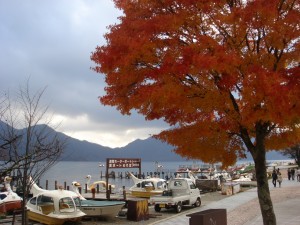
By now, we all can relate to the fact that that one semester flies by in no time. Maybe the first weeks feel slower, but as routine kicks in, it’s already time to hustle for finals. But that perceived passage of time can change so very drastically when one is taken out of that habitual comfort zone; three months is a long, long time to pass when alone in a new world. Time alone in a foreign place affords this kind of learning, as it gives one the opportunity to dedicate long hours to the sole purpose of understanding one’s own self, as well as the many unique adventures of being a newcomer to a strange land.
David To, my good friend now articling with the Ontario Ministry of Finance, echoes these thoughts in his reflections about his own time as an exchange student at Waseda University. Along with a highlighting the Japan experience, he shares with us his thoughts about the life lessons that are bound to come along the way.
Since taking some Japanese language courses years ago, David’s curiosity for the country’s culture and language grew, culminating in his choice to apply to go to Tokyo on exchange. “I wanted to go on exchange to get a chance to travel and see the world,” he says. His decision to go was compounded by the fact that it would be difficult in the future to find several consecutive months to travel. Plus, Tokyo was an opportune place to further his interest in learning the language and culture through immersive living in the city. And of course: “I had worked hard through university…I justified it as a well-deserved trip.” Well-deserved, indeed.
“The most anticipated part of my trip was the food,” he says. “In particular, I really wanted to taste the sushi there. The fish tasted much fresher, and the rice was prepared well–even at the most inexpensive restaurants.” A memorable experience was at the famous Tsukiji fish market in Tokyo, where the tuna he bought and sampled was extremely fresh, despite being unexpectedly rough in texture.
Many of the neighbourhoods in Tokyo have their own specialty menu items, and the Waseda University area is also known for something unique. “The area around the university is well-known for a dish called abura-soba. It is essentially ramen noodles without the soup, but instead is served hot with oil, and then you mix chilli and vinegar into it,” he details. “It was my first meal in Japan, at which time I didn’t fully appreciate it. But after one of my classmates would rave about abura-soba every class, I came to like it so much that I decided to have it for the final meal before departing Japan.”
Another must-go place he mentions is Nara, a city east of Osaka, with some of the most beautiful sights in Japan. “Nara is famous for its park where deer roam free, as deer are revered there. Even if you take a thirty minute hike up the mountain overlooking the city, there are still deer.” Vendors sell senbei, or rice crackers, to feed the deer, too. David warns though, “once you start feeding the deer, the deer will act like your best friend and follow you around!”
In sum, reflecting on the value of the experience, David affirms that spending time away on exchange is invaluable in many ways. “Without reservation, I would recommend that every student go on exchange sometime in their life. Not only do you learn a lot about a foreign culture, but you come to learn a lot about your own country, culture, and self. Only through comparison did I realize what I value, and what could be done better.”
Also, though not exactly directly relevant to his articling position, David feels that his classes definitely helped broaden the way he thinks about the laws in Canada. “Many of the classes made comparisons with laws in the U.S., France, and Germany–and then I realized that Canadian law actually isn’t that different from the laws from around the world.”
“Waseda University is among the top three universities in Japan. They put in a lot of effort to make international students welcome,” he says, but adds that not being able to speak fluent Japanese was difficult, as most locals do not speak any English. “At times, figuring things out can be very frustrating, but people are very much willing to help in whatever way they can. In short, deciding to go on exchange to Japan should not be taken lightly, but if you take up the challenge, it can be an experience of a lifetime.”
In parting, David shares a specific memory that has had a lasting impact. It was on a group trip with his residence building to Namiita, a town in Iwate Prefecture. The town was particularly hard hit by the tsunami in 2011, and still being in a state of disrepair, the residents who lost their homes continued to live in temporary housing units. “I learned from many of them that life is still difficult, with many having to move to larger cities to find work, leaving behind elderly parents, who were dearly attached to their hometown. During the trip, we delivered cyclamen flowers to the residents, played with the children, and hosted a gathering for the community,” he recalls. “This experience opened my eyes to the reality of parts of Japan outside the bustling big cities, and outside of the exchange student lifestyle. Perhaps most touching was when I asked Naoki, a ten-year-old boy whose family relocated after their home was destroyed, what he wanted to do in the future: “to make everyone happy.”
